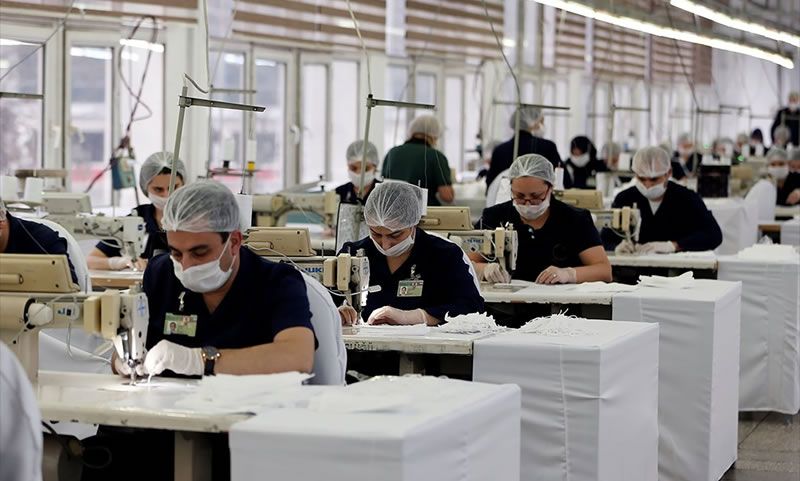2021 Data and 2022 Expectations for Ready-made Clothing Industry and Textile Raw Materials

- Cotton input costs increased by about 80% in 2021
While cotton prices increase in the range of 50-60% in the world, the increase in Turkey is higher.
“They bring the Indian price to us. Indian yarn is the poorest quality yarn in the world. It is not correct to compare yarn prices in Turkey with Indian yarn. In addition, the yarn industrialists in Turkey use cotton 10 percent higher than the world price. It should not be overlooked either. Yarn prices in Turkey are currently in parallel with the world. Of course, there may be places where it is 5 percent expensive according to quality, but there is no 20 percent difference.”
Ahmet Öksüz, President of ITHIB
- Globally, there was a significant increase in the prices of raw materials and intermediate goods, as well as freight charges in ready-made clothing and apparel, and the total cost increase was over 50% with the increase in energy costs along with the exchange rate.
In 2022, an increase of 60-70% is expected in ready-made clothing. An increase of 70% is expected as the products in the existing stores were produced in the past quarters and the price hikes have not yet been reflected, as new products appear on the shelves in March-April.
- “When the exchange rate effect is also included, the negative impact of cost increases on the capital structures of companies may also lead to decreases in production in the coming period.”
“The share of labor costs in ready-made clothing and apparel is around 35 percent, which means that it will definitely be reflected in our products. After February, we will be faced with an average of 50 percent price increases compared to the previous year, due to the increase in both the minimum wage, raw material, freight prices and general expenses.
Sinan Öncel, President of United Brands Association
- In the 2021 Pandemic, there has been an increased search for alternatives to China in ready-made clothing raw materials. The ready-made clothing industry, which receives large orders, is preparing to close with 20 billion dollars of exports, while the expectation is 13 billion, but increasing orders clearly revealed the need for investment in the industry.
“Due to the shortage of raw materials in the ready-made clothing industry, he stated that cotton production areas should be expanded in Turkey and said, “We need to produce enough commodities for ourselves.”
“We will submit our request to the Minister of Trade for the removal of additional taxes applied on yarn and fabric imports of the textile and apparel industry”
İsmail Gülle, President of Turkish Exporters Assembly (TİM)
- There are 2 suggestions regarding the supply shortage experienced due to the increase in orders in the textile sector in 2022. The first is to give priority to domestic production in raw materials and export the surplus. The second is the removal of additional customs duties on raw materials for a period of time.
“Adequate production is required for raw material production in Turkey to be used easily in the domestic market. Since production is not sufficient, raw materials have to enter Turkey from abroad. However, decision makers in Turkey do not have much idea about how much this system and production is needed. That's why they randomly impose taxes on raw materials coming from abroad.”
Gürbüz Turan-Textile Sub-Industry Products Professional Committee Chairman
“In the textile, ready-made clothing and apparel industry, price increases in cotton yarn, polyester yarn and lycra are very high. This puts ready-made garment manufacturers, who have to prepare their collections 6 months in advance, in a difficult situation. At least, we expect a sacrifice from domestic raw material producers in order to protect the textile, ready-made clothing and apparel industry. We also ask the relevant authorities to remove the antidumping and protection taxes for a short time. “
Şenol Aras-Head of Ready-to-Wear and Apparel Professional Committee
- While the Turkish economy grew by 7.4 percent in the third quarter of 2021 with the support of increased exports, the government aims to make a breakthrough in exports in 2022. The economy management claims that the Turkish lira, which has lost approximately 45% of its value against the dollar in the last year, will increase growth by creating a great advantage in exports in 2022. But the plan to level the economy with "high exports" is far from realistic, according to exporters and economists.
OTHER ARTICLES
- Advantages and Usage Areas of Culvitation of Hemp
- The Place of Hemp in Yarn and Textile Industry
- The Place of Hemp in Yarn and Textile Industry
- What is Linen and Linen Production in Turkey
- Sustainability in The Textile Industry
- Tthe Global Effect of The Pandemic and Tthe Evaluation of The Textile Sector
- Naturel Fibers and Organic Yarn Production
- Hemp Production in Turkey, A Historical Brief and Global Hemp Market
- European Flax Certificate
- Search for Sustainable Production in Textile Raw Material and the Hemp Yarn
- Linen and Hemp's Simila and Different Aspects
- Hemp Fiber and Fabric Production
- Ecological Hemp Production
- Sustainability Studies in the Textile Industry - 2021
- What is Needed for Sustainability in the Textile Industry ?
- Organic Yarn Demand Increases As Textile Raw Material Crisis Escalates
- 2021 Data and 2022 Expectations for Ready-made Clothing Industry and Textile Raw Materials
- Fiber and Hemp Yarn Production and Yarn Export in the Turkish Textile Industry
Related Articles:
Source: dunya.com , sozcu.com.tr, ekonomist.com.tr, milliyet.com.tr, itohaber.com, dw.com.tr








Filofibra Pazarlama A.Ş.
FILOFIBRA Pazarlama A.Ş. has been providing service to Turkish Textile market in the sale of fiber, yarn and fabric in Istanbul since 1986.
Address
-
Filofibra Pazarlama A.Ş
-
Levent Cad. Sülün Sok. No: 34 1. Levent, Istanbul
-
Tel : +90 212 283 3860/ 9 Hat
-
Fax : +90 212 283 3859
-
Email - This email address is being protected from spambots. You need JavaScript enabled to view it.
Address Abroad
-
Filofibra SA
-
Riva Caccia 1 / A Central Park Bldg. 6900 Lugano / Switzerland
-
Tel - +41 91 985 78 11
-
Fax - +41 91 985 78 08 - 09 - 10
-
Email - This email address is being protected from spambots. You need JavaScript enabled to view it.

